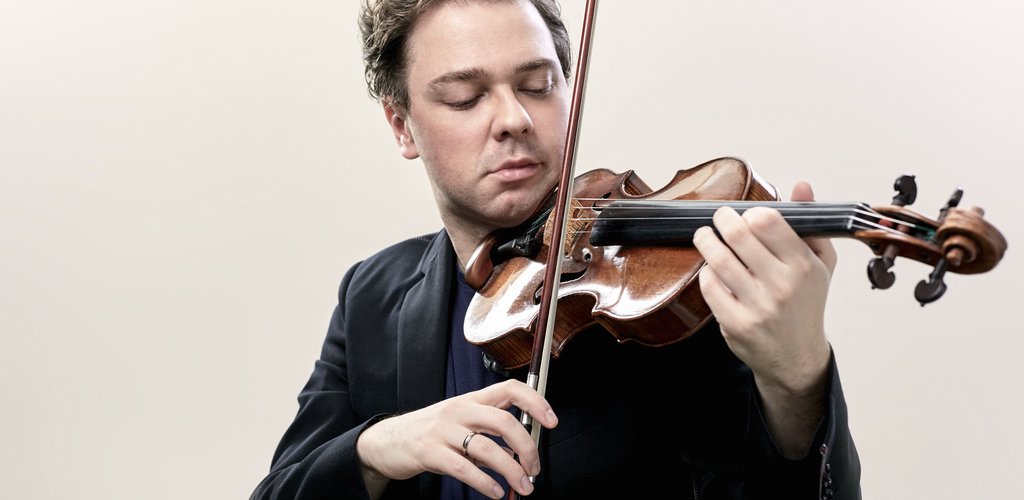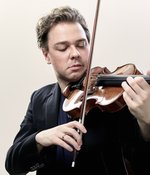It was Yehudi Menuhin himself who invited the eight-year-old prodigy from Moscow to London to study at his school. Today, he feels at home around the world as both a soloist and a chamber musician, and he currently serves as Artistic Director of the NFM Leopoldinum Orchestra in Wrocław. He is equally proud of his Russian and British roots – his musical identity is universal. Hungarian audiences can hear him in October at the Liszt Academy at the Budapest Festival Orchestra’s concerts, where he will perform Haydn’s Violin Concerto No. 3 under the baton of Gábor Takács-Nagy.
You were born in Russia but are widely recognized as a British violinist. How has this dual heritage shaped your artistic identity?
I think I am very comfortable being known as both or either. I came to the UK when I was 7 and have been a British citizen since around the age of 15, so I think it is probably quite normal that I would be considered by some people as a British musician. For me personally, I feel that my musical identity is quite universal as I was fortunate to have the opportunity to learn from many people from different musical backgrounds and that has certainly had an impact on me. I am very proud of my Russian musical heritage, but I am also extremely grateful to have had the opportunity to learn and develop as a musician in Europe.
Raised by a guitarist-composer father and a pianist mother, you grew up surrounded by music. What did that environment feel like day to day? Was it as saturated with music as people imagine?
There was certainly a lot of music in the house, but I don’t ever remember to be forced to be around it. My father, as a successful rock musician, was very often on tour with his band “Autograph” and my mother was always at the Moscow Conservatory working as she was very in demand and was collaborating with at least 3 or 4 different teachers and their students. There were of course times when people would come to our apartment for rehearsals and lessons and my mother would work with them while I was running around. But on the whole, I never felt that music was non-stop. If anything, what I really loved the most was my LP of Prokofiev’s Peter and the Wolf on one side and Benjamin Britten’s Young Person’s Guide to the Orchestra on the other. I used to listen to them almost every day.
With such a musical upbringing, did it feel natural to start early – in fact, to appear in Montpellier as an eight-year-old violin soloist?
I was very lucky to have a wonderful support system around me from an early age. I have many musicians in my family and they all helped and encouraged me from the beginning. I also had a very good teacher who worked fantastically well with young students and that allowed me to learn a lot at a young age. The performances that I was lucky enough to take part in were a consequence of getting a strong start on my musical education.
What was the most important characteristic of the Yehudi Menuhin School?
I had some wonderful moments at the Yehudi Menuhin School and there were many aspects that I enjoyed throughout my eight years there. Probably the biggest strength of the school is the versatility of the subjects, with a strong emphasis placed on chamber music and orchestra, as well as solo preparation. There were also many performance opportunities which, at a young age, is so important, as it helps you develop stage presence and builds experiences of being on stage.
What kind of impressions did you collect meeting and following Yehudi Menuhin’s classes? What kind of person was he himself?
My memories of Yehudi Menuhin are extremely vivid, although I always regret that I was so young when I had the opportunity to spend time with him. He was incredibly kind and supportive to me, and he is also the reason why I ended up in the UK, as he was the one who invited me, together with my mother and my first teacher, to come to his school. In fact, one of my treasured most memories with Lord Menuhin is performing the Mendelssohn Violin Concerto in Budapest with him conducting when I was thirteen years old.
What is the specialty of your trio, the Sitkovetsky Trio?
I have never really thought about what our speciality is because we genuinely love all of the repertoire that we get to play together. But recently, we have had more opportunities to work with new composers on new repertoire, new projects, new commissions etc. In the past 3 years, we have commissioned 5 new works for the trio repertoire which is very exciting as it will helpfully help to grow the Piano Trio repertoire which is, while not vast, probably contains some of the best music ever written. The trio is an important part of my career and it is crazy to think that we will celebrate our 20th anniversary as a group in 2027. Time flies!
This is not your first time performing in Budapest with the BFO. You have already played at the Concert for Peace with this orchestra. How do you think back to that event?
As a musician, performing with the Budapest Festival Orchestra and Maestro Fischer, was certainly one of my musical highlights. It was also very meaningful for me to make my debut with the Orchestra in such an emotional, heartfelt and overwhelming occasion. The whole evening felt very bittersweet, because of course, the musical event is very exciting, but the reasons why we need to hold such a concert is heartbreaking. However, the whole performance was an incredibly uplifting experience, and I was very proud to have a chance to play a small part in such an important evening.
Interview by Júlia Váradi

